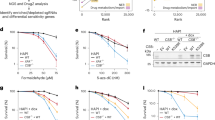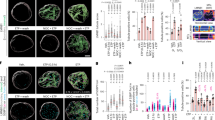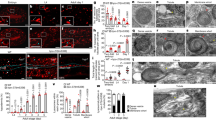Abstract
The cellular response to stresses such as heat shock involves changes in gene expression1. It is well known that the splicing of messenger RNA precursors is generally repressed on heat shock2,3, but the factors responsible have not been identified4,5,6,7,8. SRp38 is an SR protein splicing factor9,10 that functions as a general repressor of splicing. It is activated by dephosphorylation and required for splicing repression in M-phase cells11. Here we show that SRp38 is also dephosphorylated on heat shock and that this dephosphorylation correlates with splicing inhibition. Notably, depletion of SRp38 from heat-shocked cell extracts derepresses splicing, and adding back dephosphorylated SRp38 specifically restores inhibition. We further show that dephosphorylated SRp38 interacts with a U1 small nuclear ribonucleoprotein particle (snRNP) protein, and that this interaction interferes with 5′-splice-site recognition by the U1 snRNP. Finally, SRp38-deficient DT40 cells show an altered cell-cycle profile consistent with a mitotic defect; they are also temperature sensitive and defective in recovery after heat shock. SRp38 thus plays a crucial role in cell survival under stress conditions by inhibiting the splicing machinery.
This is a preview of subscription content, access via your institution
Access options
Subscribe to this journal
Receive 51 print issues and online access
$199.00 per year
only $3.90 per issue
Buy this article
- Purchase on Springer Link
- Instant access to full article PDF
Prices may be subject to local taxes which are calculated during checkout




Similar content being viewed by others
References
Yost, H. J., Petersen, R. B. & Lindquist, S. RNA metabolism: strategies for regulation in the heat shock response. Trends Genet. 6, 223–227 (1990)
Yost, H. J. & Lindquist, S. RNA splicing is interrupted by heat shock and is rescued by heat shock protein synthesis. Cell 45, 185–193 (1986)
Bond, U. Heat shock but not other stress inducers leads to the disruption of a subset of snRNPs and inhibition of in vitro splicing in HeLa cells. EMBO J. 7, 3509–3518 (1988)
Shukla, R. R., Dominiski, Z., Zwierzynski, T. & Kole, R. Inactivation of splicing factors in HeLa cells subjected to heat shock. J. Biol. Chem. 265, 20377–20383 (1990)
Utans, U., Behrens, S. E., Luhrmann, R., Kole, R. & Kramer, A. A splicing factor that is inactivated during in vivo heat shock is functionally equivalent to the [U4/U6.U5] triple snRNP-specific proteins. Genes Dev. 6, 631–641 (1992)
Gattoni, R. et al. The human hnRNP-M proteins: structure and relation with early heat shock-induced splicing arrest and chromosome mapping. Nucleic Acids Res. 24, 2535–2542 (1996)
Mahe, D. et al. Cloning of human 2H9 heterogeneous nuclear ribonucleoproteins. Relation with splicing and early heat shock-induced splicing arrest. J. Biol. Chem. 272, 1827–1836 (1997)
Bond, U. & James, T. C. Dynamic changes in small nuclear ribonucleoproteins of heat-stressed and thermotolerant HeLa cells. Int. J. Biochem. Cell Biol. 32, 643–656 (2000)
Graveley, B. R. Sorting out the complexity of SR protein functions. RNA 6, 1197–1211 (2000)
Manley, J. M. & Tacke, R. SR proteins and splicing control. Genes Dev. 10, 1569–1579 (1996)
Shin, C. & Manley, J. L. The SR protein SRp38 represses splicing in M phase cells. Cell 111, 407–417 (2002)
Arrigo, A. P. & Ahmad-Zadeh, C. Immunofluorescence localization of a small heat shock protein (Hsp23) in salivary gland cells of Drosophila melanogaster. Mol. Gen. Genet. 184, 73–79 (1981)
Velazquez, J. M. & Lindquist, S. Hsp70: nuclear concentration during environmental stress and cytoplasmic storage during recovery. Cell 36, 655–662 (1984)
Caputi, M., Mayeda, A., Krainer, A. R. & Zahler, A. M. hnRNP A/B proteins are required for inhibition of HIV-1 pre-mRNA splicing. EMBO J. 18, 4060–4067 (1999)
Xiao, S. H. & Manley, J. L. Phosphorylation of the ASF/SF2 RS domain affects both protein–protein and protein–RNA interactions and is necessary for splicing. Genes Dev. 11, 334–344 (1997)
Xiao, S. H. & Manley, J. L. Phosphorylation–dephosphorylation differentially affects activities of splicing factor ASF/SF2. EMBO J. 17, 6359–6367 (1998)
Kohtz, J. D. Protein–protein interactions and 5′-splice-site recognition in mammalian mRNA precursors. Nature 368, 119–124 (1994)
Wang, J., Takagaki, Y. & Manley, J. L. Targeted disruption of an essential vertebrate gene: ASF/SF2 is required for cell viability. Genes Dev. 10, 2588–2589 (1996)
Wang, J., Xiao, S. H. & Manley, J. L. Genetic analysis of the SR protein ASF/SF2: interchangeability of RS domains and negative control of splicing. Genes Dev. 12, 2222–2233 (1998)
Fukagawa, T., Regnier, V. & Ikemura, T. Creation and characterization of temperature-sensitive CENP-C mutants in vertebrate cells. Nucleic Acids Res. 29, 3796–3803 (2001)
Nakai, A. & Ishikawa, T. Cell cycle transition under stress conditions controlled by vertebrate heat shock factors. EMBO J. 20, 2885–2895 (2001)
Vogel, J. L., Parsell, D. A. & Lindquist, S. Heat-shock proteins Hsp104 and Hsp70 reactivate mRNA splicing after heat inactivation. Curr. Biol. 5, 306–317 (1995)
Labourier, E. et al. Antagonism between RSF1 and SR proteins for both splice-site recognition in vitro and Drosophila development. Genes Dev. 13, 740–753 (1999)
Dubois, M. F. et al. Heat shock of HeLa cells inactivates a nuclear protein phosphatase specific for dephosphorylation of C-terminal domain of RNA polymerase II. Nucleic Acids Res. 27, 1338–1344 (1999)
Hall, K. B. & Konarska, M. M. The 5′ splice site consensus RNA oligonucleotide induces assembly of U2/U4/U5/U6 small nuclear ribonucleoprotein complexes. Proc. Natl Acad. Sci. USA 89, 10969–10973 (1992)
Acknowledgements
We thank Z. Chen, T. Kashima, S. Bush, Y. Shi and X. Li for plasmids and discussion; A. Norris and A. Doty for technical assistance; I. Boluk for help preparing the manuscript; R. Luhrmann and B. Kastner for purified U1 snRNP; and W. van Venrooij for antibodies against U1-70K. This work was supported by a grant from the NIH.
Author information
Authors and Affiliations
Corresponding author
Ethics declarations
Competing interests
The authors declare that they have no competing financial interests.
Supplementary information
Rights and permissions
About this article
Cite this article
Shin, C., Feng, Y. & Manley, J. Dephosphorylated SRp38 acts as a splicing repressor in response to heat shock. Nature 427, 553–558 (2004). https://doi.org/10.1038/nature02288
Received:
Accepted:
Issue Date:
DOI: https://doi.org/10.1038/nature02288
This article is cited by
-
The aberrant upregulation of exon 10-inclusive SREK1 through SRSF10 acts as an oncogenic driver in human hepatocellular carcinoma
Nature Communications (2022)
-
Daily rhythms in gene expression of the human parasite Schistosoma mansoni
BMC Biology (2021)
-
Proteasome inhibitor-induced modulation reveals the spliceosome as a specific therapeutic vulnerability in multiple myeloma
Nature Communications (2020)
-
Targeting of Heat Shock Protein HSPA6 (HSP70B′) to the Periphery of Nuclear Speckles is Disrupted by a Transcription Inhibitor Following Thermal Stress in Human Neuronal Cells
Neurochemical Research (2017)
-
Transformer2 proteins protect breast cancer cells from accumulating replication stress by ensuring productive splicing of checkpoint kinase 1
Frontiers of Chemical Science and Engineering (2016)
Comments
By submitting a comment you agree to abide by our Terms and Community Guidelines. If you find something abusive or that does not comply with our terms or guidelines please flag it as inappropriate.



